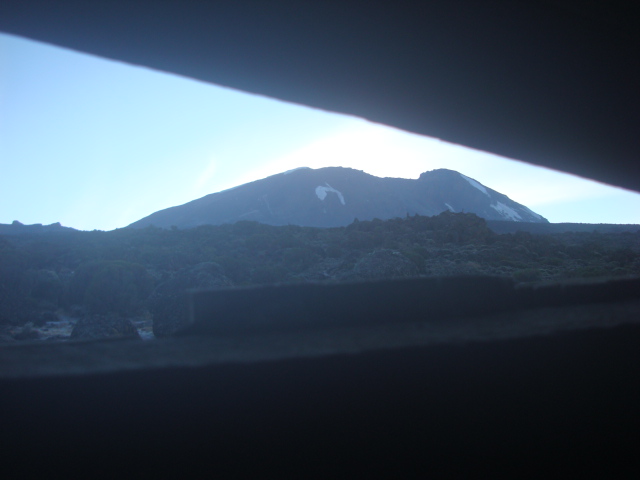Monday 5 October
In the morning at Karanga Camp someone was playing the harp (we would cross paths with him the following day) Like yesterday, Mustapha from Nakuru called me to wish me luck. He said he is also keen on climbing Mt. Kilimanjaro. |
| The mountain's unique vegetation |
We had a good view of Kibo today and the sun shone brightly in the morning. Gerald Hando went live again on Clouds FM and piled praise on the courage and determination of Notburga Maskini during the climb. "I am inspired," he said.
Today, a guide who said he is from Shinyanga but has a Chagga accent shared his views on how domestic tourism could develop by inculcating the culture of visiting local attractions in our children. When he mentioned the poor working conditions of the porters, he was supported by a flood of complaints by guides and porters who were listening to the conversation as we slowly made our way towards Barafu Camp, revealing an undercurrent of overall dissatisfaction.
 The guide from Shinyanga walked ahead to his group and, thanks to the publicity raised by Gerald's daily dispatches to Clouds FM, told his visitors who we were and the objective of our climb. When we reached the group we were greeted with, "We heard you are climbing to raise money for charity. So are we, we've raised $150,000 for cancer research."
The guide from Shinyanga walked ahead to his group and, thanks to the publicity raised by Gerald's daily dispatches to Clouds FM, told his visitors who we were and the objective of our climb. When we reached the group we were greeted with, "We heard you are climbing to raise money for charity. So are we, we've raised $150,000 for cancer research." At the final valley before ascending to Barafu Camp I told the others that I would walk ahead to find out whether "I'm made of whisky or Coca-Cola." One of Mt. Kilimanjaro's routes, considered the easiest, is also called the Coca-Cola route, and one of the challenging routes are known as whisky routes. I made such good pace with little effort that I impressed myself. I went from ceding the way to porters to keeping up with their pace.
At the final valley before ascending to Barafu Camp I told the others that I would walk ahead to find out whether "I'm made of whisky or Coca-Cola." One of Mt. Kilimanjaro's routes, considered the easiest, is also called the Coca-Cola route, and one of the challenging routes are known as whisky routes. I made such good pace with little effort that I impressed myself. I went from ceding the way to porters to keeping up with their pace. We had an early lunch and retired to our tents. I was upbeat and felt quite confident about my physical condition. Sometimes I was worried I had given too many horror stories about the difficulty of the final onslaught towards the summit that perhaps it would be detrimental to the morale of the others. I realized if I ever became an army recruitment officer, new recruitments will dwindle down to nothing.
We had an early lunch and retired to our tents. I was upbeat and felt quite confident about my physical condition. Sometimes I was worried I had given too many horror stories about the difficulty of the final onslaught towards the summit that perhaps it would be detrimental to the morale of the others. I realized if I ever became an army recruitment officer, new recruitments will dwindle down to nothing.About an hour before midnight we were awoken for the final climb to the summit.
Next: Reminiscent of the sinking of the Titanic.









